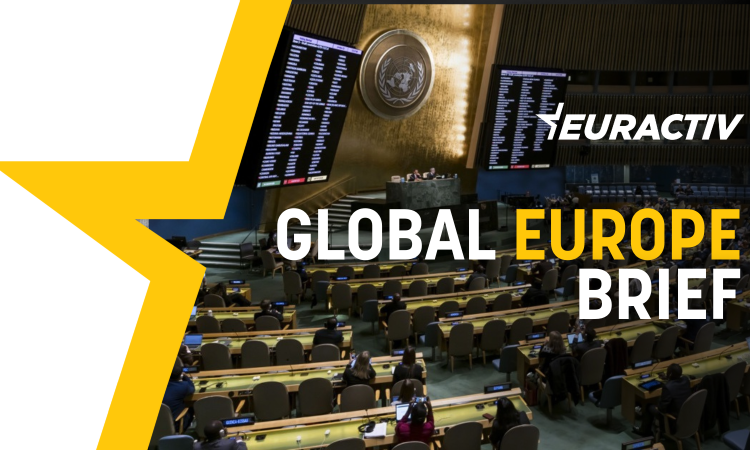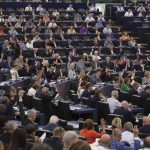
Welcome to EURACTIV’s Global Europe Brief, your weekly update on the EU from a global perspective.
You can subscribe to receive our newsletter here.
In this week’s edition: UNGA preview, SOTEU aftermath and defence budget push.
NEW YORK – Eighteen months into Russia’s war on Ukraine, Kyiv’s Western allies are struggling to court countries of the Global South and cope with a changing world order.
While the West has over the past year and a half sought to portray Russia’s war in Ukraine as a global crisis challenging the very core of the UN charter and the established international order, it is clear that not everyone agrees with this reading.
Especially the world’s biggest emerging economies—including India, Brazil, and South Africa—remain neutral on the war.
At the same time, the world order has shifted in recent months – with BRICS going up from 5 to 11 members and G20 including the African Union.
When world leaders touch down in New York for this year’s UN General Assembly this week, the aftertaste of the West’s G20 setback will be the elephant in the room in the sideline talks.
And European diplomats in Brussels and beyond have not yet decided how comfortable that makes them.
Still, many European diplomats and observers believe the West’s diplomatic balancing act in Delhi – where it refrained from leaning too hard on Russia to save G20 consensus – might come back to haunt it, with some saying the international willingness to call out Russia publicly has diminished.
The declaration language on Ukraine, to which all G-20 members committed themselves, could be a blueprint of the principles to be applied to any future peace process.
“The difficulties we saw for the West to run its point home on Ukraine at G20 could come at a higher price than we think. It might mean that we’re slowly losing our argumentative base,” one European diplomat from a non-G20 country told me after the summit.
“We will see in New York whether saving G20 consensus was in fact a turning point,” a second European diplomat said.
What most European diplomats and observers do agree on is that what is needed now is a more and much better-coordinated outreach to those still reluctant.
With the absence of the world’s big shots (see list below), New York could be the moment of truth for the EU’s and the West’s global outreach, together with the Ukrainians, to make serious and concerted attempts to woo non-Western countries.
“It will be crucial to keep running our point on Russia being the cause and perpetrator of this war home as convincingly as we can, explaining how the war is specifically hurting certain countries,” an EU official said describing the bloc’s strategy for the week.
Especially as developing countries are eager to shift the global focus onto their own priorities, ranging from global inequality and debt relief.
“But it is essential that Ukraine and its allies get their tone right – if European leaders send a signal that their top priority in New York is getting a photo op with Zelenskyy, other UN members will feel marginalised,” Richard Gowan, UN director at Crisis Group, told Euractiv.
Ukrainians, who will touch down with a large delegation, will have to use their chance and one-on-one charm to make it crystal clear that Russia, and not Ukraine and NATO, is the obstacle to peace. and explain again why Kyiv cannot trust Russia in a negotiation right now.
Zelenskyy will try to make his case both in a speech to the UN General Assembly and a flurry of bilateral meetings, according to a senior Ukrainian government official.
A key target for the diplomatic offensive will be the growing sense of global impatience.
Tactical goals for both Ukraine and European partners will be gathering support for Zelenskyy’s 10-point peace plan (towards a Global Peace summit) and countering Russia’s narratives on food security and beyond.
“Many non-Western countries are sympathetic to Ukraine, but are also struggling with their own problems, like heavy international debts,” Gowan said.
“The EU and US in particular have to show that they care about developing countries’ problems as well as the situation in Ukraine – a lot of the focus has to be on issues like reforming the World Bank to get more cash to poor states,” Gowan added.
One big focus for developing countries in New York will be holding Western countries accountable to meet their 2030 commitments to sustainable development for the world’s poorer countries.
Only a few of them have joined Western sanctions against Russia, while many have been susceptible to Moscow’s narrative that it was those measures, rather than Russia’s war, that pushed up energy and food prices.
Which is why many non-Western states believe Kyiv should be open to talks sooner rather than later to bring the war to a quicker end.
“As the war continues, the West’s overwhelming focus on this conflict risks alienating countries, especially in the Global South, that are facing their own crises, catastrophes, and challenges,” Vassilis Ntousas, head of Europe at German Marshall Fund’s Alliance for Securing Democracy, told EURACTIV.
This year’s UNGA focus on issues such as the Sustainable Development Goals would “provide a formidable opportunity to prove that a laser focus on Ukraine does not mean tone-deafness to the rest of the world”.
Ntousas described the following profound challenge for the EU and its member states in New York: “Finding ways to continue applying diplomatic pressure to Russia and support to Ukraine in tandem with big global majorities, acknowledging that the conflict is not seen as existential by a large part of the world, and dedicating attention and resources to these other parts, regions and countries that struggle.”
“So far, the EU has shown that it is cognisant of these sensitivities and aware of these risks,” he added.
LOOK OUT FOR
NOTABLE ABSENCES | French President Emmanuel Macron, who has scheduling conflicts with visits by King Charles III and the Pope, and Britain’s Prime Minister Rishi Sunak, for whom it would have been the first General Assembly since taking office, will be missing. Both countries hold a seat at the UN Security Council.
China’s Xi Jinping (who often has been absent), Russia’s Vladimir Putin (rather expected) and India’s Narendra Modi are also skipping the gathering in New York.
This means only one leader of the five countries that have permanent seats will be attending the get-together – the United States. Expect a Biden show and more room for Western reach out to countries of the Global South and attempts to woo them away from China and Russia.
ZELENSKYY SHOW | Speaking of, Ukraine’s President Volodymyr Zelenskyy will be attending this year’s UN General Assembly, hoping to gather support from non-Western partners for its 10-point peace plan. After G20, he’s facing an uphill battle.
EURO AGENDA HITS |
- Trilateral meeting between EU-UN-African Union (Sunday)
- Informal meeting of EU Foreign Affairs Ministers on Ukraine and the Sahel region + G7 Foreign Ministers’ meeting chaired by EU’s chief diplomat Borrell (Monday)
- Development Summit on the margins of the United Nations General Assembly with Von der Leyen and Commissioners Urpilainen/Suica (Monday)
- Ministerial meeting on the Middle East Peace Process, co-hosted by EU, Saudi Arabia, the League of Arab States and Egypt and Jordan (Monday)
- UNGA Opening session with Michel, von der Leyen, Metsola, Borrell and Commissioners attending (Tuesday) and Michel delivering a speech later in the week (Thursday)
- Climate Action Summit on the sidelines of the UN General Assembly (Tuesday) with speeches by von der Leyen and Michel
- Signature of the Treaty to Protect the High Seas by Von der Leyen and Commissioner Sinkevičius (Wednesday)
- High-level meeting of the UN Security Council on Ukraine (Thursday)
EU IN THE WORLD
POST-SOTEU | In case you missed it, find here all our coverage of how Ursula von der Leyen defended her track record as European Commission chief this week, touting domestic successes, while eyeing a potential second term. On the foreign policy front: calls for a European defence industry strategy, a bit of caution on enlargement details, an investigation into Chinese electric vehicle subsidies, and a new approach to Africa to counter Russia.
DEFENCE CORNER
BUDGET PUSH | Against the backdrop of Russia’s war in Ukraine, the European Parliament has backed the Commission’s proposal to spend more money on defence in next year’s EU budget even though financial resources are scarce.
EDIRPA DONE | The European Parliament approved an EU fund to incentivise joint procurement of arms for Ukraine, closing a year of intense negotiations and the European Commission’s first-ever push to help member states procure weapons.
TRANSFORMATION IDEAS | The European Commission is looking to review its priorities for allocating its defence research and development fund to focus efforts and resources on a limited number of defence projects, EURACTIV has learnt. While modalities remain unclear yet, some EU officials have expressed their surprise about the push.
ENLARGEMENT LATEST
BELGRADE-PRISTINA TALKS | Another round of talks between the leaders of Serbia and Kosovo on normalising ties failed to make a breakthrough this week after Pristina rejected an EU compromise proposal it said favoured Belgrade’s line.
WHAT ELSE WE’RE READING
ON OUR RADAR
- European Commission President Von der Leyen, Migration Commissioner Johansson visit Lampedusa, meet Italy’s PM Meloni
| Sunday, 16 September 2023 | Lampedusa, Italy - UN General Assembly high-level week *see details above
| Mo-Fri, 18-22 September 2023 | New York, United States - Russia’s FM Lavrov hosts Chinese counterpart Wang Yi
| Monday, 18 September 2023 | Moscow, Russia - ICJ hears Russian objection to Ukraine’s genocide case
| Monday, 18 September 2023 | The Hague, Netherlands - Defence ministers meet for Ukraine Defense Contact Group
| Tuesday, 19 September 2023 | Ramstein Base, Germany - European Parliament’s SEDE Committee to quiz Spanish Defence Minister Robles on EU presidency priorities
| Tuesday, 19 September 2023 | Brussels, Belgium - UN Special Rapporteur on the rights situation inside Russia presents first report to the UN Human Rights Council
| Thursday, 21 September 2023 | - European Political Community Summit
| Thursday, 5 October 2023 | Granada, Spain - Informal European Council under Spain’s EU presidency
| Thu-Fri, 5-6 October 2023 | Granada, Spain - EU’s annual enlargement package
| Wednesday, 17 October 2023 TBC| Brussels, Belgium
[Edited by Zoran Radosavljevic]







